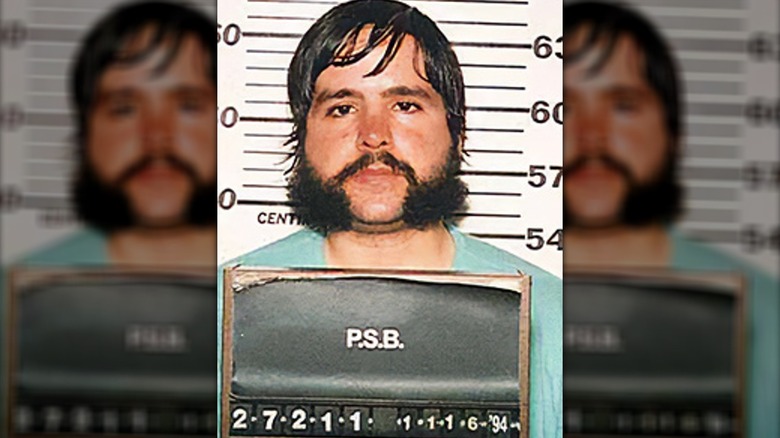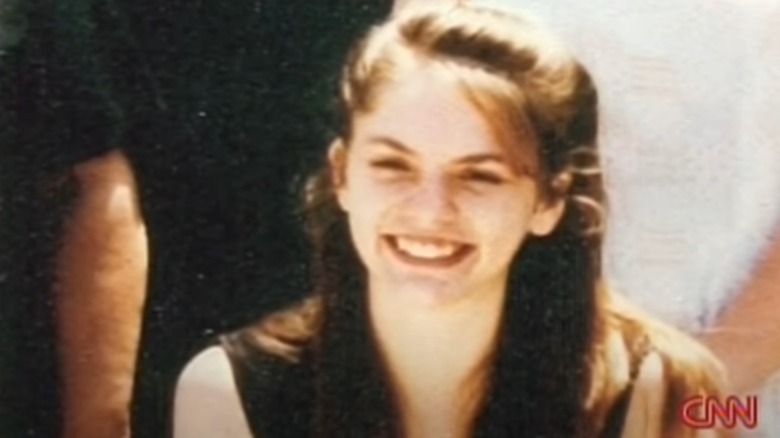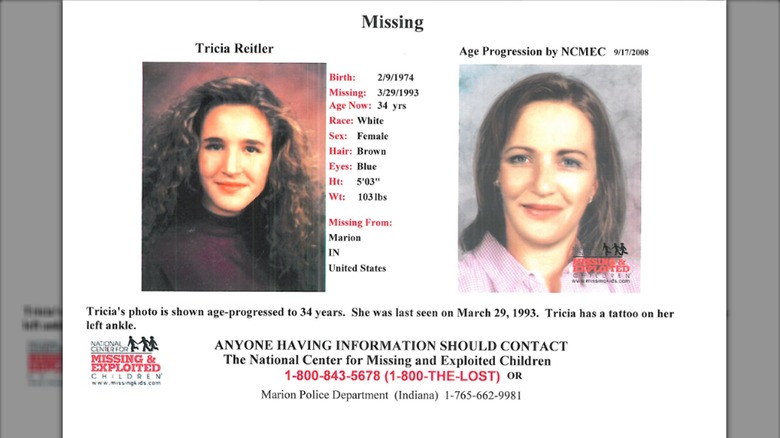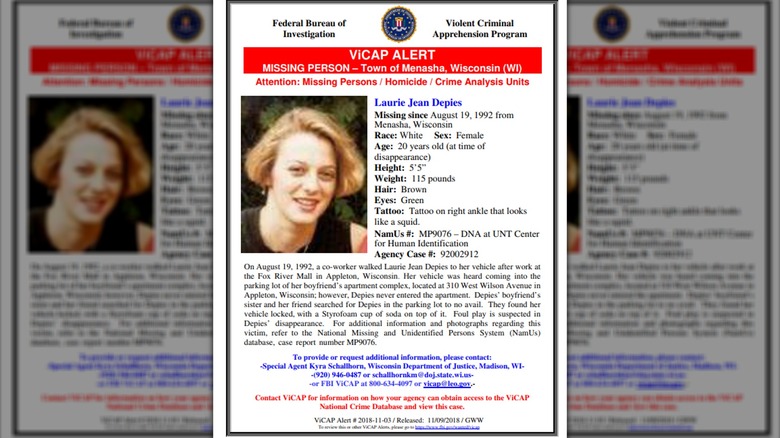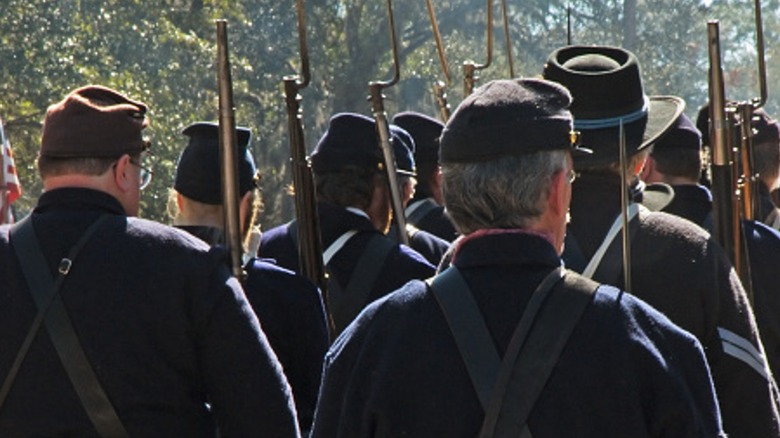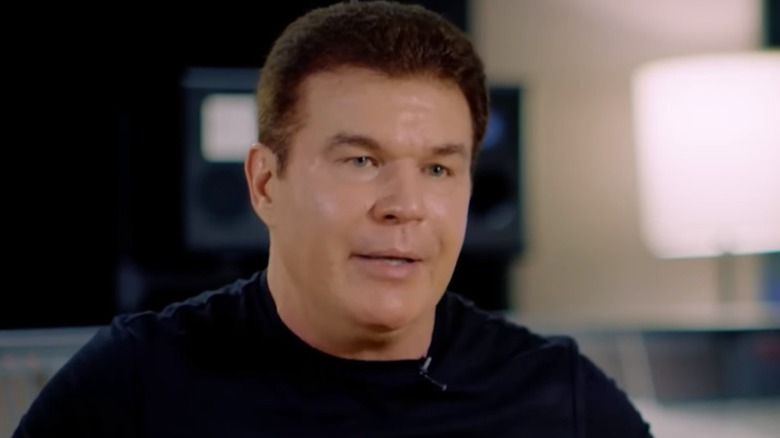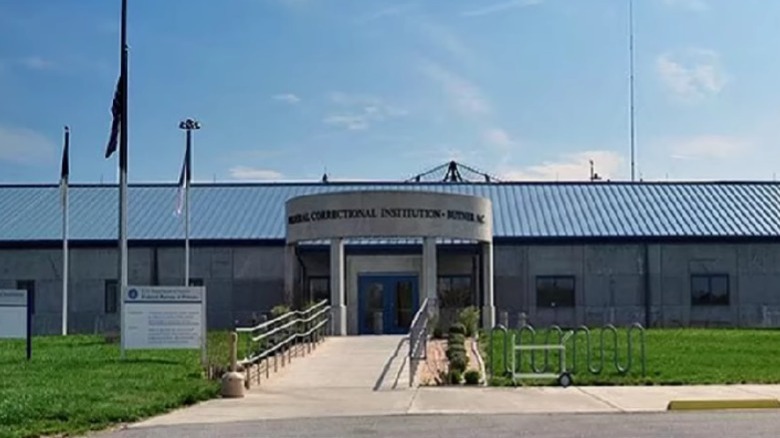The Twisted History Of Serial Killer Larry Hall
In 2022, Apple TV debuted a miniseries that, at a glance, seemed definitely fictional. "Black Bird" is the story of a convicted drug dealer who agrees to try to get a confession from a suspected serial killer in exchange for freedom, and while that might sound far-fetched, the story is absolutely true.
James Keene is the dealer-turned-informant, and the suspected serial killer is Larry Hall. Hall was arrested, tried, and convicted in connection with the 1993 disappearance and death of a 15-year-old Illinois teenager, but law enforcement had a laundry list of reasons to suspect his involvement in multiple other cases. Getting evidence and discovering what had happened to other potential victims proved next to impossible, however, and as the saying goes, desperate times call for desperate measures. Keene was sent in to try to get the information that might finally give families closure, but what he found didn't exactly turn it into an open and shut case.
Hall's story is a twisting tale of accusations, missing women, and confessions that were later recanted. Potential victims are spread out over multiple states, and multiple families have been left — for decades — looking for answers. The truth, however, remains elusive: Was Hall responsible for a single abduction and murder? Or was he one of the most prolific serial killers in United States history?
Larry Hall had a troubled childhood
Being faced with a lifetime of challenges might not excuse the behavior of a serial killer, but it is fascinating to look back at the influence early years of childhood might have on an adult — and according to Larry Hall's twin brother, Gary Hall (via CNN), Larry had severe behavioral issues from a young age. In one instance, Gary said that his brother had nearly killed him: "I just woke up out of a sound sleep to see my brother standing over me with this humongous long limb, getting ready to smash my skull."
Growing up in Wabash, Indiana, Larry had a record of juvenile delinquency that included incidents of vandalism and arson. That's supported by recollections from his brother, who explained they'd always been very different: "He was the backward twin. I was the more dominant, outgoing twin."
Evidence suggests there may have been more to Larry's lifelong struggles. Larry's IQ was estimated at around 80, which is below the average. That — along with other struggles, such as a speech impediment — has been linked to difficulties surrounding his birth: Deprived of oxygen and blue at birth, emergency medical procedures were necessary to save his life. Add in his childhood job — digging graves alongside his father, who was a cemetery caretaker — and it's thought to have all come together to create an individual who was alarmingly desensitized to the world around him.
The disappearance of Jessica Roach
Life can change in an instant, permanently and catastrophically. That's exactly what happened for the Roach family on September 20, 1993, when 15-year-old Jessica Roach's sister spotted her abandoned bike and her parents called the police. Jessica Roach was discovered six weeks later: She had been dumped in a farmer's field, where elements — and damage from a combine — meant that there was no physical evidence left behind.
Then, a few things happened that started pushing the case along, and it would ultimately allow law enforcement to give the family some closure. After someone came forward to tell law enforcement that they had seen a stranger in the field where Roach had been discovered, their information put authorities on the trail of a man with a van. Vague, sure, but it was enough that when authorities got complaints about a man in a van who had been following and harassing teenage girls, it didn't take much to put two and two together.
When one girl got the license number of the van, Larry Hall was questioned by the Vermillion County Sheriff's Office's chief investigator, Gary Miller. He told CNN that as soon as Hall saw a picture of the young girl, "He immediately flinched. He turned to his right and put his hand up over his face like he didn't want to see the picture. And he told me that he didn't think he'd ever seen that girl." Hall would ultimately confess, was tried, and convicted.
Larry Hall was connected to instances of stalking other girls
Jessica Roach disappeared on September 20, 1993, and was discovered at the beginning of November. In October of the following year, law enforcement was put on Hall's trail by two girls who claimed he had been harassing them, but they weren't the only ones to come forward. In addition to the two that led to his arrest for Roach's murder, law enforcement uncovered other incidents where teenage girls reported being followed: In at least five other reported instances occurring before Roach's death in 1993 and throughout 1994, girls had described the same thing happening.
Hall was arrested shortly after the report of his license plate, but surprisingly, that wasn't the first time he'd come to the attention of authorities. About nine months before his arrest, he was stopped in Indiana. After police found questionable items — like rope, a knife, and a missing persons poster — in his van, he was referred to a mental health expert. The missing persons notice was for a college student named Tricia Reitler ... and he would later be linked to her disappearance, too.
What happened to Tricia Reitler?
Tricia Reitler disappeared a few months before Jessica Roach, vanishing somewhere between a corner store and her dorm room. The 19-year-old was a student at Indiana Wesleyan University, and when her parents spoke with CNN in 2011, they still had no answers. The pain was still raw, and her mother, Donna Reitler (pictured, with Tricia's father, Garry Reitler), explained how it haunted them: "If you see something on the side of the road, a garbage bag, whatever, it's like, 'Could that be her?'"
That is a horrifying way to live, and it's been the Reitlers' reality for years. They were certain from the day after her disappearance that she was dead: Her bloody clothes were found and — like Jessica Roach — they had been tossed into a field. When Roach's remains were discovered, the Reitlers were devastated: "How sad to be envious of another family just because they found the body of their child," father Garry Reitler said.
Larry Hall was questioned about Tricia's disappearance — he had, after all, a missing poster of her. His story changed a few times, and initially, he told law enforcement officers questioning him that he had abducted multiple women, but, "all of the girls looked alike. I cannot remember all of them. I picked up several girls in other areas, but I can't remember which ones I hurt." When shown a picture of Tricia, Hall confirmed that he had killed her, but the next day, he recanted. "Why, I was just telling you about my dreams. That didn't really happen," he claimed.
Evidence suggested Larry Hall was connected to scores of victims
Law enforcement has been clear that they have no doubts about the likelihood that Larry Hall was responsible for way more disappearances, assaults, and deaths than the single one that he was convicted for. In the course of the investigation, authorities recovered not only photos that Hall had drawn on and altered to depict strangulation fantasies but notes he had written as well.
"Buy two more plastic tarps. Cover all floor and sides of van. No body contact, buy condoms. Buy two more leather belts. Find one now," one note read. Another: "Seen joggers and bikers, many alone. Check colleges, parks. Seen some prospects" (via CNN).
Authorities recovered notes that seemingly referenced specific women as well. Pieces of paper bearing the words "Lori" and "Fox River Mall" have been connected to a 20-year-old Wisconsin woman who disappeared in 1992. Laurie Depies left her job at the Fox River Mall and disappeared while going to her boyfriend's house, and in 2011, Hall confessed to following, kidnapping, then killing her. At the end of the day, though, the evidence wasn't concrete enough for a conviction, and the confession? Hall has confessed to at least 15 murders, then recanted his confession. He has also claimed that he never killed anyone.
His defense rested on what was called a pathological desire to please
Larry Hall may have confessed to multiple crimes, but it's still far from an open-and-shut case. Confessions are actually pretty tricky business, and there are entire books written on how police get suspects to confess, why that's not entirely a reliable judge of guilt, and the psychology of why someone might confess to something they didn't do. In Hall's case, it was argued that he had mental health issues that had compelled him to confess.
Hall's defense argued that he had a pathological desire to please, and when he thought law enforcement wanted him to confess, that's exactly what he did. Psychologists and psychiatrists who had treated him were called in as witnesses, and included in their testimony was an explanation of what was called "attention-seeking behavior and his high level of suggestibility." Simply put: Law enforcement led, and he followed.
After Hall was convicted in the Jessica Roach case, his defense suggested that the jury hadn't been sufficiently informed of the extent of his mental illness, and Circuit Court Judge Diane P. Wood ultimately wrote (via FindLaw) that "a jury with all the evidence ... might have concluded that Hall was a 'wannabe,' and that the true kidnapper/murderer is still at large." Ultimately, his conviction would be upheld.
Traveling to war reenactments gave him the perfect cover
The Belleville News-Democrat had every reason to take a special interest in the cases connection to suspected serial killer Larry Hall: In 2017, several Illinois-area cold cases were reopened as authorities continued to investigate Larry Hall's claims. The murders in question were that of Eulalia Pholia Chavez and Paulette Webster, but they also noted that he was a suspect in other murders, including Tammy Zywicki, an Illinois native attending college in Iowa, who was discovered in Missouri.
Larry Hall has confessed and recanted to a shockingly long list of murders, and although evidence is scarce, law enforcement estimates that it's possible he's behind as many as 40 murders. (For comparison, Samuel Little remains the most prolific serial killer in U.S. history, with 93 victims.) So how, exactly, did this reportedly socially inept man with below-average intelligence manage to kill undetected?
Larry's twin brother, Gary Hall, explained to CNN that post-high school, the two got into a hobby that seemed to help Larry come out of his shell. They started participating in Civil War reenactments, which Gary said was a perfect fit: "It's not only that he was dark and mysterious and obnoxious, and very quick to anger — he smelled bad. And with those muttonchops, I think he grew 'em to try to hide the acne." Zywicki's death was tied to Larry Hall because she was found near a Civil War battlefield, and it's also been suggested that a childhood spent as a grave digger made him incredibly adept at burying bodies.
Enter: James Keene
It's impossible to talk about Larry Hall without talking about James Keene (pictured), so here's a little background on the man who went undercover to try to find out just how many victims Hall may have claimed. Keene first started dabbling in dealing drugs when he was in high school, in spite of the fact that his father was a police officer ... or perhaps buoyed by the fact that his father also had mob connections, and his grandfather had connections to Al Capone. The Chicago-area Keene eventually got arrested and sentenced to 10 years in prison, but Hall's prosecution team saw some possibilities.
They offered him a deal: Get a confession from Hall, and you'll get out early, record wiped clean. He initially wanted nothing to do with it, until he saw the pictures of the alleged victims. The deal was sealed when his father suffered a life-threatening stroke. Keene wanted to spend what time he had left with him, so he went for it.
And it took months, and after general sorts of conversation, he told Hall that he'd heard the stories ... and wanted to know the truth. Keene later told Dateline (via Newsweek), "The hardest thing [I've] ever done [is] to sit there and pretend to be his friend and listen to this stuff and not just rip him apart." While he ended up getting out early — and told The Buffalo News that "the five years I had with my father meant more to me than all the money in the world," — his intel didn't really work out as he'd hoped.
The missing map
James Keene played the long game, and even after he got Larry Hall's confession to the murders of Jessica Roach and Tricia Reitler, he stayed undercover. That decision, he later told Dateline (via Newsweek), led him to the day that he and Hall were in the wood shop. What may have otherwise been a perfectly ordinary day got very, very dark: Hall had a series of carved falcons and a map — the map showed the final resting places of more victims and the falcons? Hall believed they "watch over the dead."
There's a few different stories about what happened next, but in an interview with VladTV, Keene explained that he immediately called the FBI, leaving a message about what he uncovered. He then confronted Hall, trying to "provoke him into a fight," thinking he was out the next day. Instead, he ended up in solitary confinement. He described it to The Daily Journal, saying, "I had no idea how long I would be there. I remember using a roll of toilet paper as a pillow ... you can really lose it in there." Keene spent about two weeks in solitary, and by the time he got out, the evidence was gone. He told CNN there was a lot of it: "It was a map with red dots all over Indiana, Illinois, and Wisconsin. ... I told him he was a... sicko. I told him that he was insane."
Where are they now?
James Keene did get released early, and he's spoken at length about his experiences going face-to-face with a suspected serial killer. He's written several books, including "In With the Devil: A Fallen Hero, A Serial Killer, and a Dangerous Bargain for Redemption." That was the basic premise for "Black Bird," and as creator Dennis Lehane confirmed to Entertainment Weekly Keene was executive producer and consulted for the production — even though there are parts of the story that are very, very embellished. And Larry Hall?
He was first sent to Springfield, Missouri's Medical Center for Federal Prisoners, and that's where he crossed paths with Keene. As of this writing, he's currently being held at the Federal Correctional Institution Butner Medium II, a medium-security, nearly 1,400-person facility located in Butner, North Carolina. Still convicted only in connection with the Jessica Roach case, parole was off the table — but families are still searching for answers.
Tricia Reitler's father, Garry Reitler, has spoken (via CNN) about the impact Keene's actions had — even though they still have no idea where their daughter is buried. "I think my solace is the fact that there are men and women out there who care so much that they would sacrifice to try to find where she is, so that we can bring her home."
